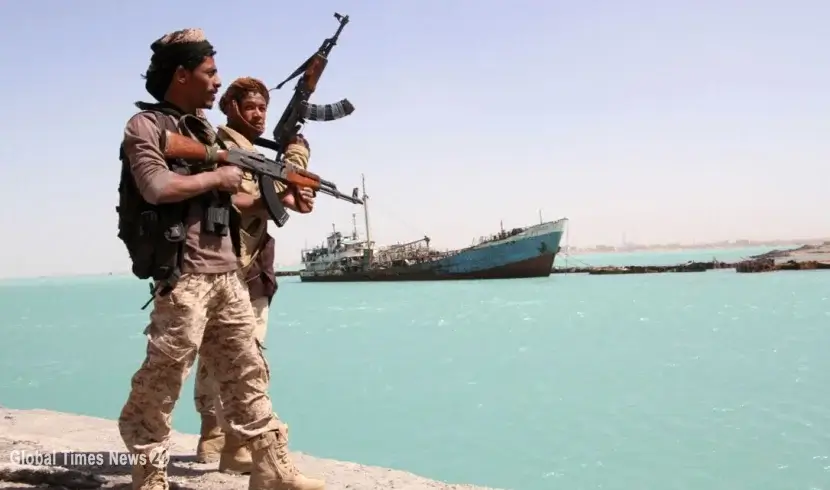Houthis: We will make the Red Sea a hotbed for Israel
Table of Contents (Show / Hide)

On November 26th, just 15 days following the "Operation Al-Aqsa Storm" where Palestinian resistance groups, including "Hamas," clashed with Israel and amid ongoing Israeli war crimes targeting children and vulnerable women in the Gaza Strip, the Yemeni army and the Houthis engaged directly not only with Israel but also with the Western world.
This confrontation occurred while Israel, America, Western nations, and Arab regimes were all supporting Israel in its actions against the defenseless Palestinian population in Gaza. Observers note that such a situation has no parallel in contemporary history, not even during the Second World War.
The battle initiated by the Yemeni army and the Houthis aimed at two significant areas. Firstly, they targeted the southernmost point of Israel, perceived as the safest part of its territory by the regime. Many settlers who had fled from northern Israel due to fear of Lebanese resistance had settled in this area, including the port of Eilat. However, the targeting of this region by the Houthis and the Yemeni army rendered no point safe for Israelis, mirroring Israel's approach of leaving no part of the Gaza Strip safe for Palestinians.
The second, and perhaps more critical objective, was to sever Israel's economic lifeline through the Red Sea. In this regard, the Yemeni army and the Houthis declared their intent to prohibit any Israeli vessel from traversing the strategic Bab al-Mandeb strait and the Red Sea. Furthermore, they announced their intention to impede the passage of commercial and cargo ships from other nations heading towards Israeli ports via this strait and sea route.
Starting from November 19 onward, they targeted every commercial and cargo ship associated with Israel. This relentless onslaught prompted numerous Western companies to announce their decision to cease crossing the Red Sea and the Bab al-Mandab strait to safeguard their security. This action not only dealt a severe blow to Israel's economy but also posed a significant challenge to the economies of Western nations, including the United States.
Despite facing ongoing airstrikes from the US and Britain, the Yemeni army and the Houthis remained resolute, emphasizing that none of these attacks would deter them from their determination. They reiterated their commitment to continue targeting Israeli ships and vessels bound for Israel.
The Yemeni army and the Houthis stipulated the cessation of their attacks on two conditions: firstly, ending the conflict against the Palestinians, and secondly, lifting the blockades imposed on the Gaza Strip.
They underscored that just as Israel "deprived the Palestinians of many things," they too would "deprive Israel of navigation rights in the Red Sea." Undoubtedly, this deprivation carries far greater weight than Israel's restrictions on Palestinians.
What has significantly heightened the importance of this confrontation is that, unlike Israel, which is grappling with the consequences of the war, and America and the West, which are facing pressure and difficulties, the Yemeni army and the Houthis are not experiencing a crisis directly related to this conflict, nor are they under significant pressure or hardship.
Moreover, if the United States and England persist in their attacks against the Yemeni army and the Houthis, this movement will undoubtedly deliver a measured and proportionate response to their aggression. While the United States and the United Kingdom have primarily relied on airstrikes to combat the Yemeni army and the Houthis, the latter have an array of options at their disposal to retaliate against such attacks. Foremost among these options are American and British naval vessels, military bases, and their strategic interests in the region.
In such a scenario, the closure of the Red Sea and the Bab al-Mandab strait would impose significant burdens not only on Israel but also on America and England. This is particularly true because they are more cognizant and better informed about the ramifications of such a blockade than any other party.
URL :
News ID : 2826

 450,000 people shouted for Netanyahu's downfall; Half the population of Tel Aviv on the street
450,000 people shouted for Netanyahu's downfall; Half the population of Tel Aviv on the street
 Saudi Arabia Urges UAE and Bahrain to Sever Ties with Israel Amid Escalating Gaza Crisis
Saudi Arabia Urges UAE and Bahrain to Sever Ties with Israel Amid Escalating Gaza Crisis
 Kazakhstan's founding president addresses nation for 1st time since protests
Kazakhstan's founding president addresses nation for 1st time since protests
 Hezbollah Fires Over 100 Rockets at Israeli Occupied Areas
Hezbollah Fires Over 100 Rockets at Israeli Occupied Areas
 Ukraine’s president calls on EU to stop ‘sponsoring Russia’s military machine’
Ukraine’s president calls on EU to stop ‘sponsoring Russia’s military machine’
 Why Palestinians in Gaza have suffered for decades
Why Palestinians in Gaza have suffered for decades
 Nakba 75: Palestinian citizens of Israel are exiles in their own land
Nakba 75: Palestinian citizens of Israel are exiles in their own land
 Operation Al-Aqsa Storm: Impact on Israeli Economy
Operation Al-Aqsa Storm: Impact on Israeli Economy
 Operation Al-Aqsa Storm and the Reverse Migration of Israelis
Operation Al-Aqsa Storm and the Reverse Migration of Israelis
 Israel Hamas War: Decoding the crisis beyond the headlines
Israel Hamas War: Decoding the crisis beyond the headlines
